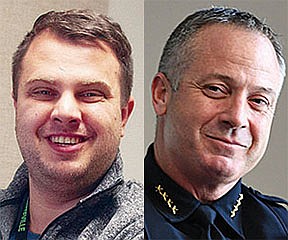FAYETTEVILLE -- Fayetteville Police Chief Mike Reynolds and social services advocate Steven Jennings were recognized earlier this month by the Arkansas chapter of the National Association of Social Workers for their efforts in establishing the department's crisis intervention response team.
Reynolds received the 2024 Citizen of the Year award. Jennings, the lead social services advocate, received the 2024 Social Worker of the Year award.
Jennings was the first social worker to join the program as an intern in 2020.
Reynolds and Jennings were lauded for securing about $900,000 in federal grant funding since 2021 to hire full-time sworn and non-sworn personnel in the division, which focuses on reducing criminalization in situations where individuals need social services.
The aim of the Police Department's crisis intervention team is to get more people the help they need with fewer people serving jail time . The idea also is to reduce encounters that involve use of force.
Overarching goals of the program include:
Reducing the criminalization of people who suffer from substance abuse, homelessness or mental health issues.
Identifying victims of crime who would benefit from additional community resources and/or counseling.
Enhancing and increasing the community's trust in the Police Department.
Collecting data to evaluate program effectiveness.
The Fayetteville Police Department was one of 34 recipients of a U.S. Department of Justice COPS grant for crisis intervention to fund two full-time social services advocate positions. The city of Fayetteville administration matched the grant to fund two full-time, 40-hour officers trained in crisis intervention to provide co-response, enhancing services.
The department uses a co-response model in which social workers are paired with police officers to handle instances of mental health crises or substance abuse. A patrol officer may initially respond to a domestic disturbance call, for example, and if he realizes no crime has been committed and the person needs counseling, he can call the crisis team. The crisis team then can refer the person for services and continues to follow up as necessary.
The number of referrals the team has made to outside organizations has climbed steadily. A December study found since 2022, the crisis intervention team had referred 1,225 people experiencing mental health issues for services, with 508 consenting to receive help.
The Police Department started the program in 2020 as an internship with the University of Arkansas' School of Social Work. It has since grown to include two teams of one social worker and one officer certified in crisis intervention.
Springdale and Fort Smith are the only other major cities in Northwest Arkansas and the River Valley with social workers on staff.
Springdale has one full-time social worker and two interns with the School of Social Work. Fort Smith has a social worker and three officers as part of its crisis intervention program.
Reynolds said he hopes to eventually have crisis intervention response teams able to respond 24/7, 365 days a year. A $400,000 federal grant the City Council accepted in December will cover salaries, benefits, training, equipment and supplies for two more social workers for two years. He said he plans to have two officers already with the department to pair with the social workers initially and likely will ask the council for two more full-time officers for the 2025 budget.
The department should be able to have a crisis team available seven days a week with limited hours after getting all four teams up and running, Reynolds said. He said that likely will happen about the middle of this year.
Jennings said the officers and social workers have learned from each other. Jennings said he's learned proper safety protocol when responding to a home, for instance. The officers have learned calling the social workers enables them to close out and get to another call quicker. They won't see as many repeat callers once the social worker gets involved, he said.
